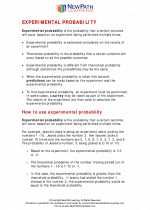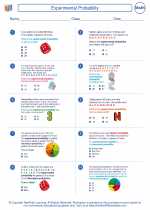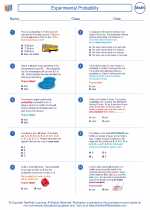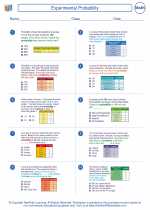Experimental Probability Study Guide
Experimental probability is the likelihood of an event happening based on the results of an actual experiment or trial. It is calculated by conducting an experiment and recording the number of times the event occurs, then dividing that number by the total number of trials.
Calculating Experimental Probability
To calculate the experimental probability of an event, you can use the following formula:
Experimental Probability = Number of times the event occurs / Total number of trials
Example:
Suppose you roll a standard six-sided die 30 times and record the number of times a 4 is rolled. If the number 4 comes up 8 times, the experimental probability of rolling a 4 is:
Experimental Probability = 8 / 30 = 0.267
Steps to Calculate Experimental Probability
- Conduct the experiment and record the outcomes.
- Count the number of times the event of interest occurs.
- Divide the number of favorable outcomes by the total number of trials.
Key Concepts
- The experimental probability will change as the number of trials increases.
- The experimental probability may not always reflect the theoretical probability of an event.
Applications of Experimental Probability
Experimental probability is used in various real-life situations such as:
- Weather forecasting
- Sports statistics
- Market research
Practice Problems
Calculate the experimental probability for the following scenarios:
- You toss a coin 50 times and it lands on heads 28 times.
- A basketball player makes 35 out of 50 free throw attempts.
- A spinner is spun 40 times and lands on red 12 times.
Now you can use this study guide to understand and practice experimental probability!
.◂Math Worksheets and Study Guides Eighth Grade. Experimental Probability

 Worksheet/Answer key
Worksheet/Answer key
 Worksheet/Answer key
Worksheet/Answer key
 Worksheet/Answer key
Worksheet/Answer key
